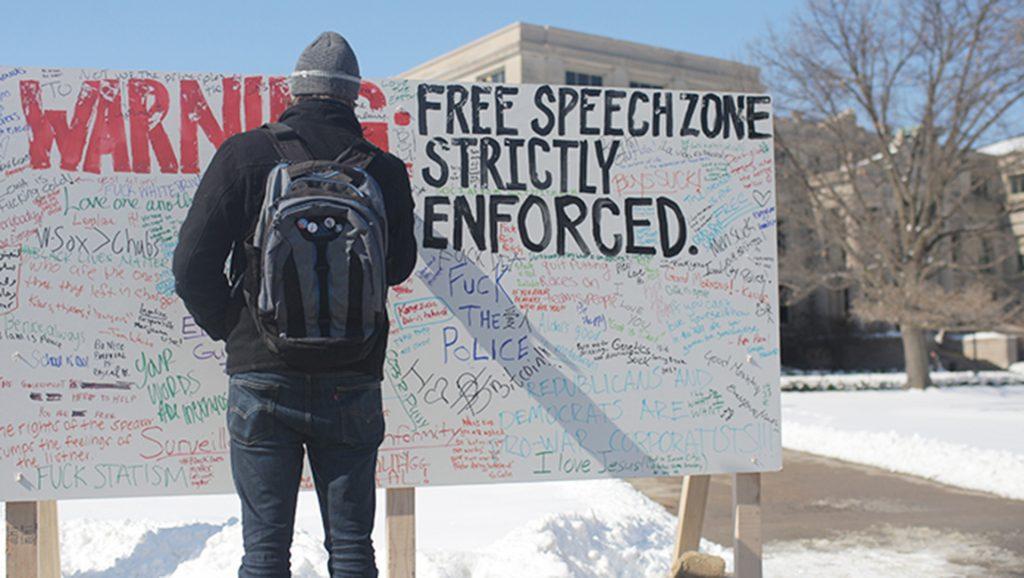Shaw: New Iowa free-speech law strengthens campus culture
Gov. Kim Reynolds recently enacted a law prohibiting restriction on free speech within college campuses and eliminating free-speech zones. It was a rightful decision that all Iowa college students should support.
UI senior Spencer Smith writes on a board for the Freedom of Speech protest put on by Young Americans for Liberty group on the Pentacrest on Thursday, Feb. 26, 2015. The student-run group allowed anyone to write whatever they wanted on the board.
April 7, 2019
Gov. Kim Reynolds signed Senate File 274 into law on March 27, prohibiting restriction on free speech on college campuses. In particular, the law rightfully focuses on the erasure of so-called “free-speech zones,” instead designating public areas of college campuses as “public forums.” The First Amendment deems public forums as places that allow all speech. The new law comes directly after recent tensions among students on college campuses and their right to protest and speak up about controversial social and political issues.
At the University of Iowa, students exercise their free-speech rights in response to major national and local issues. For example, pro-immigration groups have responded to students advocating for border security. In other student-led protests, the UI community stood in support of sexual-misconduct survivors and against then-UI Lecturer Jeff Nock, who had reportedly taken photos of women without their permission in the Campus Recreation & Wellness Center.
RELATED: Reynolds signs bill addressing free speech on public campuses
Students’ ability to use their free-speech rights to strike back against what some bystanders construed as xenophobic, hateful speech and expression or against perpetrators of sexual misconduct is what the First Amendment is all about. Speaking up to make sure your voice is heard, especially when it is one that was historically ignored, is the quintessential point of free speech and its glory. The best way to fight back against hate speech is better, more inclusive speech.
The argument for “free-speech zones” is flawed because of the consequences such a space would cause. If students are only allowed to exercise their free speech in certain spaces, they are being limited in every other space and their voices are therefore silenced.
RELATED: Cappel: President Trump signs crucial free-speech executive order
When institutions impede on constitutional rights such as free speech, the slippery-slope argument presents itself with a valid possibility of affecting every voice on campus. You have to think about how that speech is not only going to affect the other side but yours as well. If one side of speech is being prohibited in a particular space and you don’t agree with it, that sounds like a good policy. However, that same policy will undoubtedly affect you and the freedoms you are accustomed to having in your right to speak up and against certain conditions, events, policies, movements, etc.
Instead of aiming for a law that would only grant free speech in certain spaces, use your platform and create a supportive community that amplifies your voice and drowns out the haters.
RELATED: Students clash over Trump’s proposed U.S.-Mexico border wall
Iowa State University showed this is an effective method of combating speech or spectacles that make people feel attacked or unsafe when a majority of the student body essentially blacklisted white nationalist Nick Fuentes. The Des Moines Register reported Turning Point USA invited Fuentes to speak, and he reportedly spoke about the dangers of immigration and preserving “European texture” of the United States while belittling the intelligence and civilization of marginalized peoples. Students expressed outrage at his blatant ignorance and racism, responding with stronger rhetoric that showed their support for people of color.
The best way to combat negative speech is with louder, good speech. So speak up — it’s your constitutional right.






